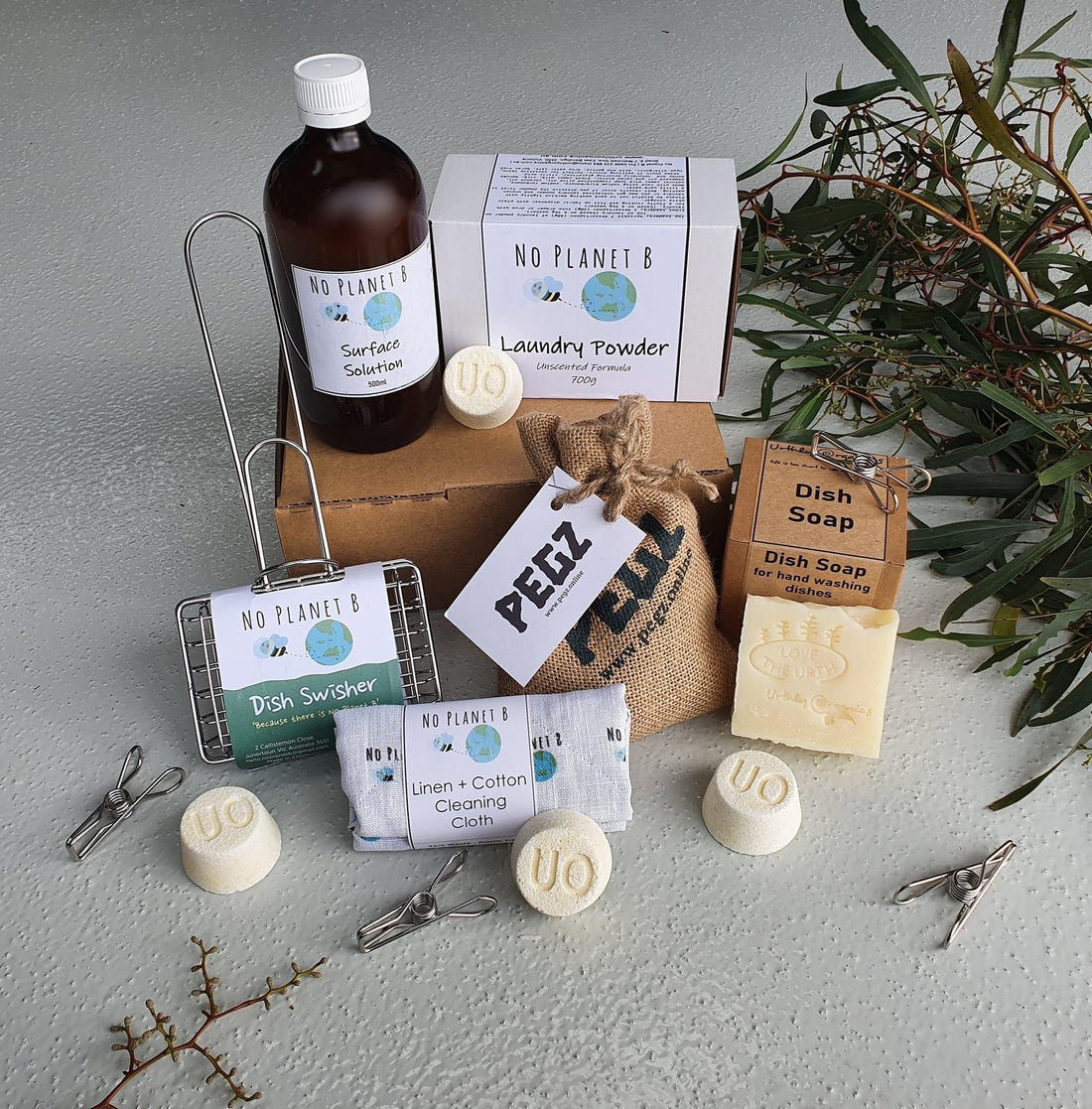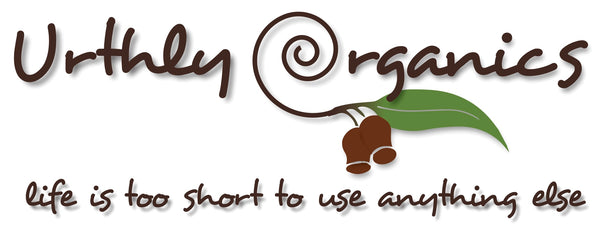
5 Ways to Reduce Single-Use Plastic At Home
Share
This is an ongoing series we hope to deliver at Urthly Organics as part of our Products with Purpose blog.
With the rise in consumer awareness of their social and environmental impact, companies must look to evolving their products to be as sustainable as possible. However, many businesses have instead begun to greenwash their products and customers.
‘Greenwashing’ [1] refers to the insincere and superficial display of concern towards environmental issues by organisations such as labelling items that take years to break down as ‘biodegradable’, sustainable palm oil and its derivatives, third party animal testing, and not paying workers a fair wage for manufacturing ‘eco-friendly’ products[2]. The use of branding can mislead the public into buying unethically.
Which makes one question, how do we know what we are buying is aligned to our values? The answer is not straight forward. Ideally, everyone would be a ‘conscious consumer’, whereby individuals base their purchasing decisions are based on the transparency and shared values of a company. However, for some people and situations, this is not always possible in every situation. This is where companies need to assist in providing the opportunity to buy ethically.
With our business aiming to provide some alternative to environmentally unsustainable products (namely skincare and cleaning), we believe that it’s important for us as people to hold a critical lens to what we are being sold. Here are some of the things we look for when making the conscious decision to purchase a product, ingredient, or service.
Plastic
We all know that plastic is not the best choice for the planet. The fibres take up to a thousand years[3] to break down. Over this time, animals die from ingesting or getting entangled in our waste, and we pollute our planet with chemicals that are released in the process[4].
With plastic being so commonplace in the world, we have to look for sustainable alternatives to preserve our delicate natural world. This is why many people are actively cutting plastic from businesses and homes. However, knowing how and where to start is difficult. The changes take time, energy, and research.
To assist in your plastic-free journey, we have some tips on how to phase plastic out of your life.
Check Under the Sink:
Commercial cleaning products are typically packed in a way that the bottle is meant to be used once. On top of the plastic waste, the ingredients can further impact the environment. Water pollution, air pollution, and leaching can occur from the toxic chemical compounds that cleaning products can contain[5].
After you use up a commercial cleaning product, seek out a plastic-free product. So many options are available. For example, at Urthly Organics, we have alternatives to dishwashing detergents, dishcloths, laundry powder, and other cleaning products.
Reduce by Re-fill:
In the home, people typically have a collection of containers or bags for shopping and food. There are stores available that allow people to bring a container for various items, such as nuts, pantry items, and cleaning. Farmers and produce markets. Making use of these stores will allow for less plastic to enter the home and landfill.
Re-Purpose and Re-use:
In many cases, it can be easy to dispose of something rather than re-purpose. The continued disposal fits one purpose, making us as consumers needing other solutions. By thinking outside the box with our waste, we can create new ways to address our problems. Milk bottles can be turned into pot plants[6], lids can be transformed into prosthetic limbs[7], or chip packets getting shrunk to create jewellery[8].
At Urthly Organics, one thing we have repurposed is our order packing trays. Originally plastic lychee punnets at our local fruit and veggie shop, the plastic trays were going to be thrown away. By saving them, not only have we reduced plastic waste, but we have a beneficial tool that allows us to improve our operations.
Shop Local:
Check your local area for farmer’s markets, small makers, and local shops. These can usually provide a lower-waste item. And by shopping local, you support the community and small-scale environmental change at the same time. Plus, by shopping small, you can find some wonderful hidden gems in your local area.
Alternatively, if this isn’t possible, look online for initiatives supporting these kinds of businesses. Places like the Victorian Country Market[9] provide a wide range of products from small enterprises that offer plastic-free products.

Ask for Alternatives:
Businesses rely on consumers. In the purchase of a product, ask if there is a plastic-free alternative available. In some cases, you can find plastic-free alternatives or even multipurpose products, such as our shampoo soap being both a hair soap and for use on the body as well.
When buying online, be conscious of how an item gets to you. Your order may not contain plastic, but the shipping of your parcel may. This can be common in greenwashing companies, defeating the purpose of alleviating plastic. Ask companies for a plastic-free shipping option using biodegradable compounds like compostable satchels and paper.
Our Impact
At Urthly Organics, we are constantly evolving to ensure that we are as low plastic as possible. While we still do have products that are packaged in plastic, we are in the process of phasing out to plastic-free alternatives. Most recently to this article, we have removed our hand and body wash from a plastic PET bottle to an aluminum tin refill. This means that people re-use their plastic, and place value on what they already have.
We also do not use plastic wrapping or satchels in the shipment of orders and offer the option of unpackaged items (for those who leave a note at checkout).
We hope these suggestions spark your creativity to reduce your plastic consumption.

References:
[1] Kenton, W., via Investopedia (2020), ‘Greenwashing’: https://www.investopedia.com/terms/g/greenwashing.asp
[2] Green & Thistle (2020), ‘What is Greenwashing? Examples [2020]’: https://greenandthistle.com/what-is-greenwashing/
[3] Evironment dot com: https://www.keepcasscountybeautiful.com/images/PDF/Recycling/how_long_does_it_take_garbage_to_decompose.pdf
[4]World Animal Protection (2020), ‘Sea Change: You Can Help Tackle Ghost Fishing Gear to Save a Million Lives’: https://www.worldanimalprotection.org.au/sea-change-you-can-help-tackle-ghost-fishing-gear-save-million-lives?gclid=Cj0KCQjwqfz6BRD8ARIsAIXQCf2CsIXVdIigF4x2kVZUEM1YDX6NVh6Uir3FEBUBsVTg3BKQsoCMzmIaArrzEALw_wcB
[5] Roche, E. (2020), ‘The Environmental Impact of Cleaning Products’, PJ Online: https://www.pjponline.com/the-environmental-impact-of-cleaning-products/#:~:text=Commercial%20use%20of%20cleaning%20products,and%20enter%20the%20food%20chain.
[6] Pinterest, ‘Milk bottle Planters’: https://www.pinterest.com.au/pin/371195194289379949/
[7] Baker, D. (2019), ‘Turning Lids into Prosthetic Limbs’, North Eastern Advertiser: https://northeasternadvertiser.com/featured-articles/turning-lids-into-prosthetic-limbs
[8] Pinterest, ‘hip Packet Earrings’ :https://www.pinterest.com.au/pin/498281146243311653/
[9] Victorian Country Market (2020): https://viccountrymarket.com.au/
Images:
Main image: Urthly Organics
Image 2: iStock images
Image 3: J.McKenzie
Image 4: Urthly Organics

